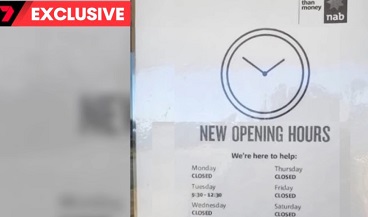The Australian Alert Service is the weekly publication of the Australian Citizens Party.
It will keep you updated on strategic events both in Australia, and worldwide, as well as the organising activities of the Citizens Party.
To subscribe to the Australian Alert Service, it's easy, and it's secure.
Lead Editorial
31 August 2022
Vol. 24 No. 35
From the time of Federation in 1901 it was widely recognised that the federal government needed national control over banking to provide for the economic future of the nation. The Constitution thus provided it with the power to make laws concerning “Banking, other than State banking, the incorporation of banks, and the issue of paper money”.
A banking bill was announced in the first sitting of Federal Parliament that very year. Tasmanian MP King O’Malley made a national bank the key plank of his campaign in the election of 1901, and by 1905 it was part of the federal Labor Party platform. Two years later liberal Acting PM John Forrest pushed the government to establish a Post Office Savings Bank. Drafting of a bill commenced, but it remained for the Labor Party to flesh out the idea in 1908 with its proposed “Commonwealth Bank of Issue, Deposit, Exchange and Reserve”, after which support built rapidly across the country. In 1909 O’Malley made a legendary five-hour speech to parliament, explaining how the bank would transform the nation.
In 1911 Labor Prime Minister Andrew Fisher was loathe to take on the private banks by acting on Labor’s policy, so to force a binding caucus vote on Fisher, O’Malley formed his famous “Torpedo Brigade”, involving Labor MPs, unionists and other organisers. It took 15 months of relentless organising, but O’Malley got his vote through the caucus and the bill passed easily; the Commonwealth Bank was legislated in November 1911.
Australian think tank Per Capita, in its 2020 report “Postbank: Filling a void, securing essential services”, pointed to a similar tale with the creation of Kiwibank: “Just like the story of the establishment of the Commonwealth Bank in Australia, the role of a single determined individual, in the right place at the right time, was pivotal in the formation of Kiwibank.”
New Zealand MP Jim Anderton led the fight to re-establish a public post office bank in New Zealand starting in 1987. He campaigned to restore public banking in NZ for over 13 years, and like King O’Malley for the first several of those years, he was the only elected official in New Zealand doing so. He famously “stood on street corners yelling with a megaphone at passing motorists during the 1999 election about how they were being ripped off by Australian-owned banks”, according to accounts in the New Zealand Herald.
After a mammoth battle, in the end Anderton’s bank took but a moment to become reality. Entering his Alliance Party into coalition with the Labour Party led by Helen Clark in 1999, Anderton commenced negotiations for his post office bank. After more than three hours of debate in which he effectively countered every objection put up, deputy leader of the Labour party Annette King finally appealed to Finance Minister Michael Cullen: “Michael, Jim’s beaten back every argument against the bank we’ve ever put up, for God’s sake give him the bloody bank.” With no leg left to stand on, Cullen replied: “Oh, all right then.” Kiwibank was launched in 2002.
Our modern Torpedo Brigade has been at work in earnest on the postal bank project since the political assassination of Christine Holgate—the CEO who wanted Australia Post to become a bank. In that time, we have recruited an incredible array of politicians from all parties, business groups, unions, bank victims, local councils and other organisations. We are no longer alone as we had been for decades in the push to restore a government role in banking.
The bipartisan nature of support for this proposal can create a shockwave that in a time of crisis forces the Prime Minister to consider this proposal, just as Fisher and Clark did. We can succeed in this mission, and if we do it will punch a hole in the fabric of bank control over this country, creating the possibility for many more victories for the common good.
In this issue:
- Major event: Parliament House forum on the public post office bank solution
- A fence at the top of the cliff
- ACTU quietly declares war on Labor Party economic policy
- Jobs summit must look at hole in industry skills training
- Solomon Islands PM responds to Four Corners smear 7
- Australia’s foreign influence operation
- London leads in making Ukraine war longer and more dangerou
- Congress outdoes Biden in push for world war
- Bank closures propel support for a post office Bank
- Jackson Hole conclave: Crushing the real economy since 1978
- ALMANAC: Freedom, and lessons from the French Revolution
- Shelburne and Jefferson stoke chaos in France
Click here for the archive of previous issues of the Australian Alert Service








